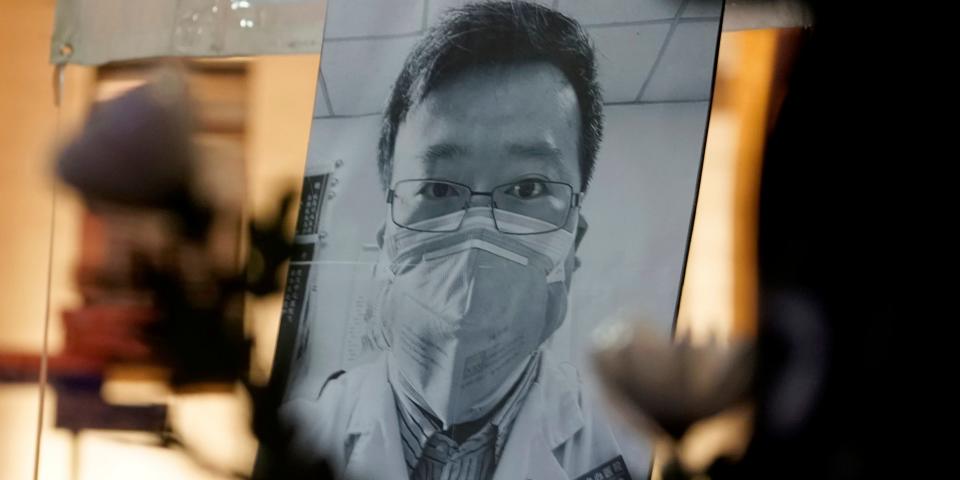China says admonishing doctor and coronavirus whistleblower Li Wenliang was 'improper,' calls for punishing local officials

AP Photo/Kin Cheung
Authorities in Beijing have wrapped up an investigation into the death of Li Wenliang, the doctor who blew the whistle on the coronavirus outbreak, and his admonishment by local law enforcement.
The National Supervisory Commission said on Thursday that investigators concluded that local authorities in Wuhan mishandled the situation and followed "irregular" and "improper" law-enforcement procedures, state media reported.
Li, one of eight doctors reprimanded by the police, was forced to sign a letter acknowledging that he was "making false comments." He died from the coronavirus in early February.
Investigators recommended that officers involved in reprimanding Li should be punished. State media reported that the Wuhan Police Department had issued a formal apology to the doctor's family.
Chinese investigators have determined that Wuhan law-enforcement officials' admonishing of Li Wenliang, the doctor who blew the whistle on the coronavirus outbreak, was "improper," state media reported on Thursday.
The National Supervisory Commission said investigators looking into the young ophthalmologist's death concluded that local authorities in Wuhan mishandled the situation and followed "irregular" and "improper" law-enforcement procedures.
On December 30, Li sent a message to his former classmates from medical school warning that a handful of patients in Wuhan had symptoms similar to severe acute respiratory syndrome and urging them to be cautious.
Video: Why You Shouldn't Judge Yourself for Having Coronavirus Anxiety
Screenshots of Li's message went viral. "I only wanted to remind my university classmates to be careful," he later told CNN, adding, "When I saw them circulating online, I realized that it was out of my control and I would probably be punished."
Li, one of eight doctors reprimanded by the police, was forced to sign a letter acknowledging that he was "making false comments."
The doctor checked in to Wuhan Central Hospital on January 12, later saying on Weibo that he had tested positive for the coronavirus. He died on February 7.

LI WENLIANG/GAN EN FUND via REUTERS
"During the fight against the novel coronavirus outbreak, Li Wenliang, an ophthalmologist at our hospital, was infected. Efforts to save him were ineffective. He died at 2:58 a.m. on Feb. 7. We deeply regret and mourn his death," Wuhan Central Hospital said shortly after his death.
As Li's death sparked public outrage, China's Central Commission for Discipline Inspection said it would send investigators to look into "issues raised by the people in connection with Dr. Li," Reuters reported.
Putting the blame on local law enforcement, investigators recommended that the police officers involved in reprimanding Li be punished and that the letter of admonition be withdrawn.
"Punishment will be carried out to relevant parties and personnel that have been slow in response, lost control in the prevention process and were ignorance of their job duties during the epidemic," the commission said in a statement.
According to state media, the Wuhan Police Department issued an apology to Li's family and offered to provide compensation.
The US and China have sparred over who is to blame for the virus
China has faced criticism, especially from the US, for its handling of the coronavirus outbreak. The virus has infected more than 220,000 people and killed more than 9,000 people worldwide since first appearing in Wuhan.
"Rather than using best practices, this outbreak in Wuhan was covered up," the White House national security adviser Robert O'Brien said last week, adding, "It probably cost the world community two months to respond."
China has been working hard to reshape the narrative about the coronavirus, with some officials arguing that it may not have originated in China and fueling unfounded speculation that it may have originated in the US.
Last week, a Chinese foreign ministry spokesman drew the ire of the US State Department and the Department of Defense when he wrote on Twitter that "it might be US army who brought the epidemic to Wuhan."
In response, President Donald Trump has called the coronavirus the "Chinese virus." "China was putting out information, which was false, that our military gave this to them," he said at a recent press briefing. "Rather than have an argument, I said I have to call it where it came from, and it did come from China."
China has expressed strong opposition to such comments. "Recent comments by US officials have smeared China," a Chinese foreign ministry spokesman said on Thursday, adding that "the world should cooperate instead of insulting others and passing on responsibility."
In the US, the virus has infected more than 10,000 people and killed more than 150 people. China has reported more than 81,000 cases, with more than 70,500 recoveries and 3,200 deaths.
Read the original article on Business Insider

